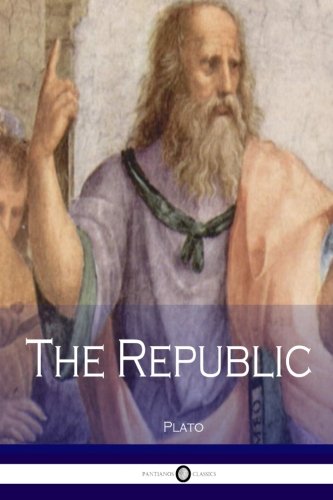Items related to The Republic

The Republic is the most famous text written by Plato, which takes the form of a philosophical dialogue. The text is part conversation between a group of friends active in the Athens intellectual community, and part monologue from various participants in the discussion. The narrator and lead character is Socrates, Plato's friend and mentor, who appears in most of his pupil's dialogues and acts as surrogate to Plato's ideas. Throughout the text the 'Socratic method', whereby Socrates feigns ignorance and questions an adversary to receive insight on a given subject, is demonstrated.
Ten books in total comprise The Republic, the divisions thought to have been made due to the length of a roll of papyrus in Ancient Greece. The discussion begins with an attempt to find a definition for justice, wherein a disagreement between Thrasymachus - who believes justice is what is good for who is strongest at a given place and time - and Socrates, who believes that all members of society should, for the highest benefit of all, conform to just action.
In Book II, the discussion expands to include justice in the sense of a social contract. Whether or not justice happens only due to fear of reprisal, and whether justice is truly a high virtue of itself, are among the questions considered. Eventually the discussion expands further into the idea of a just city state: ideas of how such a society, embodying justice and order, might work commences with Socrates proposing an educated 'guardian' class of able-bodied men and women who would uphold order and defend such a city against threats from outside.
After expanding their ideas on the guardians, the dialogue proceeds onto other classes. It is here that Plato's famous idea of the philosopher king arises - the notion of a ruler who is appointed for holding the highest understanding of good and just rule, imparted to him at an early age by capable educators.
Plato as Socrates eventually proposes that the essence of justice is fulfilling one's role in society. The correct assignment of an occupation to each citizen, to which they can happily commit, will result in a just and capable society. Further stipulations upon this ideal society are given; that education be strictly regulated and human reproduction made a matter for the state, with no offspring knowing their parents.
The Republic then covers four forms of injustice manifested in systems of government - timocracy, oligarchy, democracy, and finally tyranny. How these unjust societies occur is talked about at length, with examples from Ancient society cited as Socrates/Plato develops theories on how societies go astray. The most unjust ruler - the tyrant - is discussed at length, and determined to be among the most unhappy, unfree and unfulfilled types of man owing to his thrall to passions, and friendless owing to his commitment to hierarchy. Such malfeasant politics are excoriated; in the end, Socrates says, all are harmed and none benefit from tyranny.
Between books VII and VIII Socrates establishes the famous Allegory of the Cave as a way of demonstrating education's effects upon the human mind. By using the image of people who have only lived in a dark caves their whole lives, he illustrates how mere shadows against the walls are the closest such individuals come to seeing reality. Philosophy, Socrates argues, is the way by which humans are freed from this cave of ignorance and propelled to an enlightenment.
Socrates concludes the discussion of city politics and rulers, and commences to focus upon the nature of art and its place in the just and ideal city. He also discusses reincarnation, the indestructible nature of the human soul, concluding the epic text on a spiritual note.
"synopsis" may belong to another edition of this title.
This celebrated philosophical work of the fourth century B.C. contemplates the elements of an ideal state, serving as the forerunner for such other classics of political thought as Cicero's De Republica, St. Augustine's City of God, and Thomas More's Utopia.
Written in the form of a dialog in which Socrates questions his students and fellow citizens, The Republic concerns itself chiefly with the question, "What is justice?" as well as Plato's theory of ideas and his conception of the philosopher's role in society. To explore the latter, he invents the allegory of the cave to illustrate his notion that ordinary men are like prisoners in a cave, observing only the shadows of things, while philosophers are those who venture outside the cave and see things as they really are, and whose task it is to return to the cave and tell the truth about what they have seen. This dynamic metaphor expresses at once the eternal conflict between the world of the senses (the cave) and the world of ideas (the world outside the cave), and the philosopher's role as mediator between the two.
"About this title" may belong to another edition of this title.
- PublisherCreateSpace Independent Publishing Platform
- Publication date2016
- ISBN 10 1534626913
- ISBN 13 9781534626911
- BindingPaperback
- Number of pages194
- Rating
Buy New
Learn more about this copy
Shipping:
US$ 3.00
Within U.S.A.
Top Search Results from the AbeBooks Marketplace
The Republic
Book Description Paperback. Condition: new. Brand New Copy. Seller Inventory # BBB_new1534626913
The Republic
Book Description Paperback. Condition: new. New Copy. Customer Service Guaranteed. Seller Inventory # think1534626913
The Republic
Book Description Paperback. Condition: New. Brand New!. Seller Inventory # VIB1534626913
The Republic
Book Description Paperback. Condition: new. New. Seller Inventory # Wizard1534626913
The Republic
Book Description Condition: new. Seller Inventory # FrontCover1534626913

